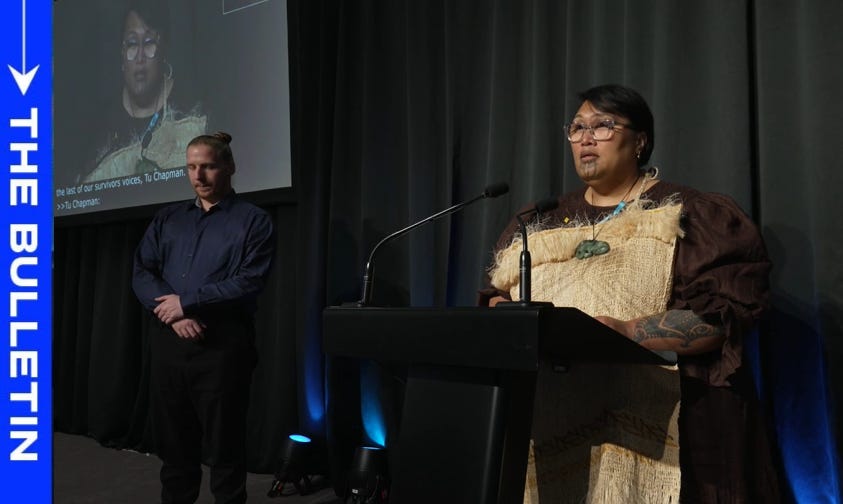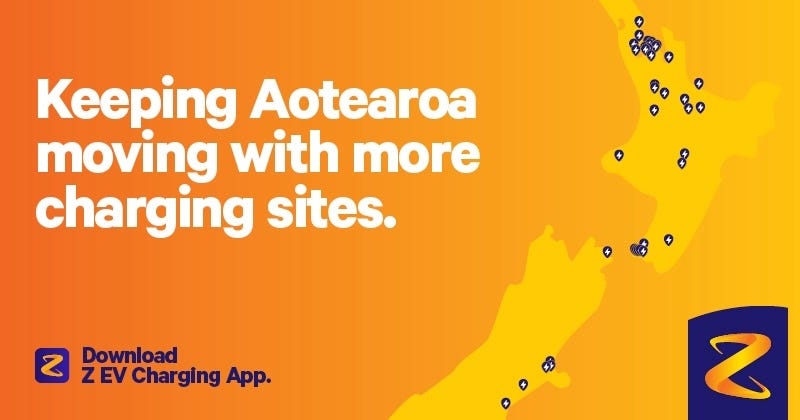Horrific, heartbreaking, wrong: Who apologised, and how
Politicians and public sector bosses say sorry, but victims of state abuse have something to say, too.
Kia ora and welcome to The Bulletin for Wednesday, November 13. Today’s edition is written by Toby Manhire, sitting in for Stewart Sowman-Lund.
In today’s edition: The hīkoi arrives in Auckland. Another blow for manufacturing. But first, the day of apology, its power and its limits.
Sorrow and substance
The prime minister stood in the House of Representatives shortly before noon yesterday on what he called a “significant, sorrowful but important day”. Christopher Luxon issued a “formal and unreserved apology” on behalf of his and preceding governments to victims of decades of abuse in state and faith-based care. “It was horrific,” he said. “It was heartbreaking. It was wrong. And it should never have happened. For many of you it changed the course of your life, and for that, the Government must take responsibility.”
His address – disrupted early on from the public gallery by serial interruptor Karl Mokaraka – marked a historic day, but not a completion. While there are pledges of improvement to redress and compensation schemes, there is little detail, and we are unlikely to know just how much the state intends to spend until the budget next year. The words of one survivor, as reported by the Herald, strike to the core: “An apology without redress is meaningless.”
“As much as an apology is an important step in acknowledging what happened and accepting the Crown’s responsibility for what occurred over decades, apologising on behalf of an institution (and therefore the decisions and oversight of others) is the relatively easy part of the process,” writes Luke Malpass for the Post. “The difficult bit will be what the government is now embarking on. That is the hard work of reforming public information, safety systems and processes and, above all else, what redress might be made in the form of monetary compensation. At the base of that issue is the morally impossible question of, how much money is enough – or at least sufficient – to make up for a life that has been ruined?”
Hugs, heckles and hollowness
Luxon’s was not the only apology. Chris Hipkins added his on behalf of the Labour Party. And seven public sector leaders took their turn at the parliamentary banquet hall podium earlier yesterday. (You can watch all of yesterday’s proceedings here.) Their speeches, which uniformly addressed past failures, formally apologised and committed to avoid repetition, prompted a mixed response. There were hugs and high-fives; other survivors declared the apologies “hollow” and heckled the speakers, questioning their authenticity and demanding, for example, that the revived boot camp scheme be binned.
The audience became most fired up during the address by Una Jagose, the solicitor general. She and Crown Law were criticised by the Royal Commission for resisting legal challenges. Jagose, as Laura Walters has detailed for Newsroom, has faced resignation demands from survivors. Jagose’s apology was heartfelt, no doubt, but she repeatedly prefaced her examples of errors made with “at times” or “sometimes”. In my view, the speakers who landed more compellingly yesterday avoided any hint of qualification.
Survivor Tu Chapman, also speaking early in the day, noted the absurdity of being asked to "respond to a prime minister’s apology we haven't even heard", and observed Luxon’s absence from the room. Any true contrition, she added, would manifest in the closure of Oranga Tamariki.
The view that matters
The most important part of this apology, needless to say, is not in its making but its receipt. Survivors attended in Wellington but at other gatherings around the country, where the livestream was aired. I strongly recommend you read the accounts from parliament, from Auckland and from Christchurch, by my colleagues Joel MacManus, Lyric Waiwiri-Smith and Alex Casey. They collect and share visceral responses from survivors and affectingly capture the wairua of those rooms.
Looking for the closest EV charger near you? Z’s public EV charging network is now visible on Google, providing customers with up-to-date information on nearby EV chargers, including handy information like charger specification and availability.
Check out our website to find out more information about Z’s EV charging network.
Hīkoi arrives in Auckland
It’s day three of the Hīkoi mō te Tiriti, which began in the far north and is making its way towards parliament for November 19. With numbers estimated to grow from the current group of about 1,000, the march is protesting the Treaty Principles Bill and other government policies that impact Māori.
After crossing the harbour bridge at around 9.30am, one group will head for Takaparawhau (Bastion Point) and another for Ihumatao.
Waitematā District Commander Naila Hassan told RNZ this morning that there was likely to be “significant disruption around the city”, while stressing that to date “everyone taking part is peaceful and united, which is absolutely awesome”. She said: “[Police] have a number of people working on this today … We do have contingency for escalation in place.”
RNZ has live updates here.
Sistema down
They’re everywhere. Maybe, like me, you’re about to fill one with your children’s lunch. Part of the reason Sistema plastics are so widely beloved is that all their manufacturing is done in New Zealand. Founder Brendan Lindsay is so committed to that principle that he made it a condition of its 2017 sale, as he explained in this fascinating interview with the NZ Herald’s Shayne Currie. Sadly that has not prevented its new owners from proposing a significant cut to its staffing, Stuff reports.
A spokesperson for E Tū union acknowledged “work has been slowing down since last year, and we know the production costs have risen for the company”, while Sistema management cited the “challenging” macroeconomic environment as driving the move, which represents a 25% to total headcount. It suggests that unemployment, which last week rose to 4.8%, might not be done with its slow march upward..
Support longform journalism in New Zealand at The Spinoff
Joel MacManus’s investigation into the urgent race to solve homelessness in Aotearoa is the kind of vital journalism that is impossible without funding from Spinoff members and donors. If it matters to you and you are able to, please donate or become a member today.
Click and Collect
A case of measles has been confirmed on Waiheke Island in Auckland.
An intriguing idea to save Wellington’s glorious City to Sea Bridge: fill it with sand (and park a digger round the corner).
Another Wellington institution, Shihad, have announced they’re breaking up, almost 40 years in.
They’re calling it the greatest comeback in football history: four goals in added time (including a hat-trick for gas engineer Tom Atkinson) that nicked Yarm & Eaglescliffe a 6-5 win over Sunderland West End in England’s Northern League Division Two.
An NBC report on climate policy down under comes with the headline, As Australia puts more focus on climate change, New Zealand is accused of pulling back.
All six episodes of Home Education, in which we meet a range of families for whom school and home are the same place, are now online for viewing, and well worth your time.
How is the revamped Three News faring? Duncan Greive has the ratings. Liam Rātana explains the search the trilingual interpreters. Tara Ward hitches her wagon to a new series of Moving Houses. Lyric Waiwiri-Smith writes from Auckland’s most secretive music festival. And a disabled beneficiary details how they spend their money.
That’s it for today, thanks for reading. See you back here tomorrow morning.
Want to get in touch? Join the conversation in the Substack comments section below or via email at thebulletin@thespinoff.co.nz if you have any feedback on today’s top stories (or anything else in the news).
If you liked what you read today, share The Bulletin with friends, family and colleagues.












